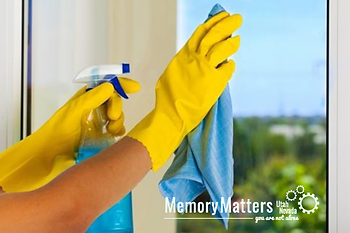As the last of the snow melts away and the weather begins to warm up, thoughts turn to spring and all that entails – vibrant daffodils, blossoming tress, longer days, Easter treats, and, of course, spring cleaning!
Sorting through your abode in preparation for the new season can be a challenging task at the best of times, but it can be even more complex if you are caring for someone living with dementia, as you’ll likely have more to consider. That’s not to say that spring cleaning should be avoided – there are, thankfully, a number of simple tips that you can follow to ensure that you get your home in tip-top shape after the long winter. Read on to learn more:
1. Locate important information
Caring for an older relative, especially those living with dementia, means that you will likely be in charge of important paperwork pertaining to their finances and care, journalist Joan Lunden explained, writing for The Huffington Post. Examples include power of attorney documents, deeds for the house and so on. An important first step while spring cleaning is to find all of these documents and store them all in one place – ideally in a water-proof and flame-proof safe – if you haven’t done so already. Keeping everything crucial together can give you peace of mind and eliminate the stress of hunting for the paperwork when it is most needed.
2. Remove hazards
Elderly individuals, and particularly those living with dementia, are at a greater risk of becoming injured from common household hazards. For example, seniors are at risk of falling in cluttered hallways, which can lead to injury, and those experiencing dementia could become sick from ingesting old or incorrect medications or expired food. As such, an article from One Call Alert recommended using your spring cleaning period as a time for hazard assessment. Look for areas that can pose danger and work to remedy the problem, whether that involves ensuring that rugs do not move around, throwing away old medications or ensuring that dangerous items such as knives and guns are safely stored away.
3. Dispose of junk
One of the most important parts of spring cleaning is working through old items that your loved one likely no longer needs. As Lunden argued, this can be a challenge both in terms of logistics – it can be time consuming – and emotions, as your loved one may be reticent to let things go that they no longer need. As such, be sure to set off a block of time dedicated to this one task – an entire day if necessary – and be sure to include your loved one in the process. Lunden advised encouraging the individual to consider keeping only the things he or she truly needs and only the items that hold the most sentimental value. This process is particularly important if your loved one is soon to enter an assisted living facility.
4. Ask for assistance
Spring cleaning can be a momentous chore, even for those who aren’t caring for another. That’s why it is important to reach out and ask for assistance from family and friends, an article from The Caregiver’s Journal explained. Don’t be afraid to ask – those closest to you will likely be more than happy to lend a helping hand. If you do not have friends or family nearby, consider hiring workers to help you. Contingent on your senior’s level of mobility, it can also be fruitful to ask him or her to help at certain stages, particularly when you are sorting through their belongings. In essence, spring cleaning should be a collaborative effort – do not attempt to handle everything on your own.
5. Look for repairs
Spring cleaning is an ideal time to look for repairs that need seeing to, an article from Alzheimer’s Universe detailed. Perhaps the smoke alarm battery has died or the bath upstairs leaks a little. Whatever needs attention, make a note and then call in assistance from a professional to remedy the issues.
6. Work on a budget
A proper spring clean can cost money. After all, as mentioned above, you’ll likely want to address any repairs that need to be done and remove items that are no longer working, some of which may need to be replaced. That doesn’t mean, however, that your efforts need to cost you and your loved a fortune. As explained in the article by One Call Alert, preparing ahead of time by devising a budget can help you keep costs as low as possible.
*********************************************************************************
***Volunteers: Memory Matters Wants You!***
Summer is almost here and some of our dedicated volunteers have moved on to cooler climates. We currently have a variety of volunteer opportunities available at Memory Matters. Whether you can volunteer for a few hours a week or several hours a day, Memory Matters wants you! We have opportunities both mornings and afternoon; in the Memory Matters’ office or providing support at our Memory Activity Class at the St. George Senior Center. For more information call Marilyn at 435-319-0407.
*********************************************************************************

